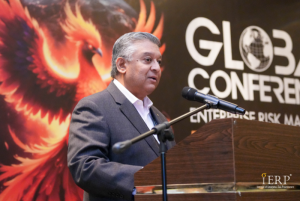@ the IERP® Global Conference, August 2024
Moderated by Promod Dass, Deputy Group CEO, RAM Holdings Bhd and CEO, RAM Solutions Bhd, the first-panel discussion of the IERP Global Conference 2024 saw three members speaking on Emerging Risk: Firdaos Rosli, Chief Economist, Ambank Group, Dr Tricia Yeoh, CEO, IDEAS, and Wan Suhaimie, Head of Economic Research, Kenanga Investment Bank Bhd. “Risk is something that can be mitigated – but if it happens, it happens,” Promod said. “The organisations that get through are the ones that have the capacity like resources, money, and people.”
Firdaos remarked that it has also moved into measurable things, such as inflows coming into the bond market, and the scale of an event. “But there are still some things we cannot measure,” he added. “We cannot be entirely sure what really happened. There is an event but everything goes back to normal as if nothing happened. This is very destructive because we have the question of accountability. Nobody wants to take charge.” Promod remarked that it was interesting how risk could come and go, but economies could still handle it.
Dr Yeoh said that with growing unpredictably, there was a need for companies to build buffers into their systems, but this was expensive; not all of them would be able to do this. There were many factors to consider, including changes in external legislation. “The EU is launching its new Supply Chain Act, looking at practices of suppliers ten layers down,” she said. “In terms of governance, the National Baseline Assessment of Human Rights covers governance, labour and environment. What are the compliance measures that companies will eventually need to incorporate?
The term ‘human rights’ may be contentious, especially among the more conservative sectors of society, which will not react positively to using the term human rights when it comes to business, she said. Other factors like the carbon tax, mattered too, and certain industries needed to be taxed first, before others. Institutions like the judiciary, parliament and the MACC needed to be strengthened, to deal with emerging risks. “If we can trust our institutions in times of need, we can we trust that they will make the right and fairest decisions on behalf of business and society as well,” she said.
On the impact of the US Presidential Elections on the market, Wan Suhaimie said that although Trump was being seriously challenged by Harris, the market was more focused on the Fed’s rate cuts, and geopolitical events in other parts of the world like the Middle East, China, Taiwan and the South China Sea. “The financial markets are more positive towards Trump for a second presidency,” he said. “But if it’s Trump, it will be more stressful for the China relationship.” However, more capital was expected for emerging markets, including Malaysia.
“Bond flows have increased quite substantially, about RM7 billion or so,” he said. “This is an indication that the market is looking for high-yield, better prospects.” Projected to hit 6% in the second quarter of 2024, Malaysia’s GDP growth is expected to be 5% for this year. The Ringgit is forecasted to stabilise at 4.42 to the US Dollar by year-end, having already hit 4.39 recently. If Trump wins, it will be good for business and investments, although there may be a reversal in foreign policy.
Agreeing that a Trump victory could be good for business but terrible for foreign relations, Dr Yeoh said this was due to the unpredictability of his decision-making. “The sporadic nature of his thought processes will increase geopolitical risk,” she remarked. Closer to home, she said Malaysia was very interesting because some states were now demanding more autonomy in terms of policy and sharing of fiscal revenues. “There is tension and competition with the federal government,” she said. “It will likely increase, and it is in the federal government’s interest to set up a more productive, deliberative platform between federal and state governments.”
This will impact businesses, particularly if the government wants to drive more FDI into the country. There is also the issue of limitations of land. Governments of both Penang and Selangor see a shortage of land. “If states want to do better, increase regional investments, and reduce the gaps or disparities between regions and states, we need to think about how states themselves can be more resilient,” she said. Promod then invited comments on the potential impact of Malaysia joining BRICS, the RON 95 subsidy rationalisation, and carbon tax.
On BRICS, Firdaos pointed out that Malaysia and Thailand were the only countries in Southeast Asia which were applying for membership in BRICS. “There is no one single driving force in BRICS,” he said. “It is a coalition that does not have a single objective, unlike the WTO, ASEAN, NAFTA and other organisations established since WWII.” On RON 95 and the carbon tax, he said that it was something that needed to be done. “We have to address it sooner or later…just do it; it’s the only way to move forward. There’s no right time to do it but whether there is political will, is another question.”
“I think Malaysia just likes joining clubs,” quipped Wan Suhaimie, on Malaysia’s BRICS membership application move, but he attributed it to wanting to make use of BRICS “to be more of a voice.” He agreed with Firdaos on the RON 95 issue, that the government will definitely have to introduce the measure. “The only question is when,” he said. Pointing out that there were many other risks to be aware of as well, Dr Yeoh said the government was currently in a good position to make changes like carbon tax reforms, institutional reforms and subsidy rationalisation, but needed to do so quickly.
Firdaos cautioned that risk practitioners should not depend on what they knew in the past, as this may not be relevant today. Wrapping up, Promod added that risk was about asking questions, both about what one does and does not know. “It’s also about anticipating and preparing for risks that you cannot see today,” he concluded.


























